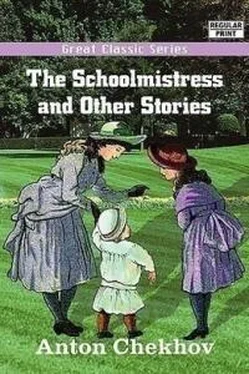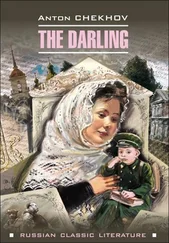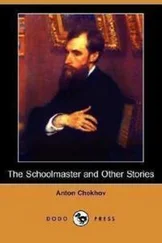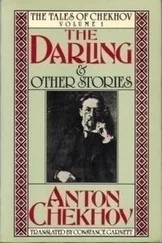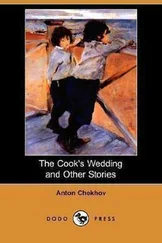At supper the conversation turned on Lesnitsky
"He left a wife and child," said Startchenko. "I would forbid neurasthenics and all people whose nervous system is out of order to marry, I would deprive them of the right and possibility of multiplying their kind. To bring into the world nervous, invalid children is a crime."
"He was an unfortunate young man," said Von Taunitz, sighing gently and shaking his head. "What a lot one must suffer and think about before one brings oneself to take one's own life,…a young life! Such a misfortune may happen in any family, and that is awful. It is hard to bear such a thing, insufferable…."
And all the girls listened in silence with grave faces, looking at their father. Lyzhin felt that he, too, must say something, but he couldn't think of anything, and merely said:
"Yes, suicide is an undesirable phenomenon."
He slept in a warm room, in a soft bed covered with a quilt under which there were fine clean sheets, but for some reason did not feel comfortable: perhaps because the doctor and Von Taunitz were, for a long time, talking in the adjoining room, and overhead he heard, through the ceiling and in the stove, the wind roaring just as in the Zemstvo hut, and as plaintively howling: "Oo–oo–oo–oo!"
Von Taunitz's wife had died two years before, and he was still unable to resign himself to his loss and, whatever he was talking about, always mentioned his wife; and there was no trace of a prosecutor left about him now.
"Is it possible that I may some day come to such a condition?" thought Lyzhin, as he fell asleep, still hearing through the wall his host's subdued, as it were bereaved, voice.
The examining magistrate did not sleep soundly. He felt hot and uncomfortable, and it seemed to him in his sleep that he was not at Von Taunitz's, and not in a soft clean bed, but still in the hay at the Zemstvo hut, hearing the subdued voices of the witnesses; he fancied that Lesnitsky was close by, not fifteen paces away. In his dreams he remembered how the insurance agent, black–haired and pale, wearing dusty high boots, had come into the bookkeeper's office. "This is our insurance agent…."
Then he dreamed that Lesnitsky and Loshadin the constable were walking through the open country in the snow, side by side, supporting each other; the snow was whirling about their heads, the wind was blowing on their backs, but they walked on, singing: "We go on, and on, and on…."
The old man was like a magician in an opera, and both of them were singing as though they were on the stage:
"We go on, and on, and on!…You are in the warmth, in the light and snugness, but we are walking in the frost and the storm, through the deep snow…. We know nothing of ease, we know nothing of joy…. We bear all the burden of this life, yours and ours…. Oo–oo–oo! We go on, and on, and on…."
Lyzhin woke and sat up in bed. What a confused, bad dream! And why did he dream of the constable and the agent together? What nonsense! And now while Lyzhin's heart was throbbing violently and he was sitting on his bed, holding his head in his hands, it seemed to him that there really was something in common between the lives of the insurance agent and the constable. Don't they really go side by side holding each other up? Some tie unseen, but significant and essential, existed between them, and even between them and Von Taunitz and between all men—all men; in this life, even in the remotest desert, nothing is accidental, everything is full of one common idea, everything has one soul, one aim, and to understand it it is not enough to think, it is not enough to reason, one must have also, it seems, the gift of insight into life, a gift which is evidently not bestowed on all. And the unhappy man who had broken down, who had killed himself—the "neurasthenic," as the doctor called him—and the old peasant who spent every day of his life going from one man to another, were only accidental, were only fragments of life for one who thought of his own life as accidental, but were parts of one organism—marvelous and rational—for one who thought of his own life as part of that universal whole and understood it. So thought Lyzhin, and it was a thought that had long lain hidden in his soul, and only now it was unfolded broadly and clearly to his consciousness.
He lay down and began to drop asleep; and again they were going along together, singing: "We go on, and on, and on…. We take from life what is hardest and bitterest in it, and we leave you what is easy and joyful; and sitting at supper, you can coldly and sensibly discuss why we suffer and perish, and why we are not as sound and as satisfied as you."
What they were singing had occurred to his mind before, but the thought was somewhere in the background behind his other thoughts, and flickered timidly like a faraway light in foggy weather. And he felt that this suicide and the peasant's sufferings lay upon his conscience, too; to resign himself to the fact that these people, submissive to their fate, should take up the burden of what was hardest and gloomiest in life—how awful it was! To accept this, and to desire for himself a life full of light and movement among happy and contented people, and to be continually dreaming of such, means dreaming of fresh suicides of men crushed by toil and anxiety, or of men weak and outcast whom people only talk of sometimes at supper with annoyance or mockery, without going to their help…. And again:
"We go on, and on, and on…" as though someone were beating with a hammer on his temples.
He woke early in the morning with a headache, roused by a noise; in the next room Von Taunitz was saying loudly to the doctor:
"It's impossible for you to go now. Look what's going on outside. Don't argue, you had better ask the coachman; he won't take you in such weather for a million."
"But it's only two miles," said the doctor in an imploring voice.
"Well, if it were only half a mile. If you can't, then you can't. Directly you drive out of the gates it is perfect hell, you would be off the road in a minute. Nothing will induce me to let you go, you can say what you like."
"It's bound to be quieter towards evening," said the peasant who was heating the stove.
And in the next room the doctor began talking of the rigorous climate and its influence on the character of the Russian, of the long winters which, by preventing movement from place to place, hinder the intellectual development of the people; and Lyzhin listened with vexation to these observations and looked out of window at the snow drifts which were piled on the fence. He gazed at the white dust which covered the whole visible expanse, at the trees which bowed their heads despairingly to right and then to left, listened to the howling and the banging, and thought gloomily:
"Well, what moral can be drawn from it? It's a blizzard and that is all about it…."
At midday they had lunch, then wandered aimlessly about the house; they went to the windows.
"And Lesnitsky is lying there," thought Lyzhin, watching the whirling snow, which raced furiously round and round upon the drifts. "Lesnitsky is lying there, the witnesses are waiting…."
They talked of the weather, saying that the snowstorm usually lasted two days and nights, rarely longer. At six o'clock they had dinner, then they played cards, sang, danced; at last they had supper. The day was over, they went to bed.
In the night, towards morning, it all subsided. When they got up and looked out of window, the bare willows with their weakly drooping branches were standing perfectly motionless; it was dull and still, as though nature now were ashamed of its orgy, of its mad nights, and the license it had given to its passions. The horses, harnessed tandem, had been waiting at the front door since five o'clock in the morning. When it was fully daylight the doctor and the examining magistrate put on their fur coats and felt boots, and, saying good–by to their host, went out.
Читать дальше
